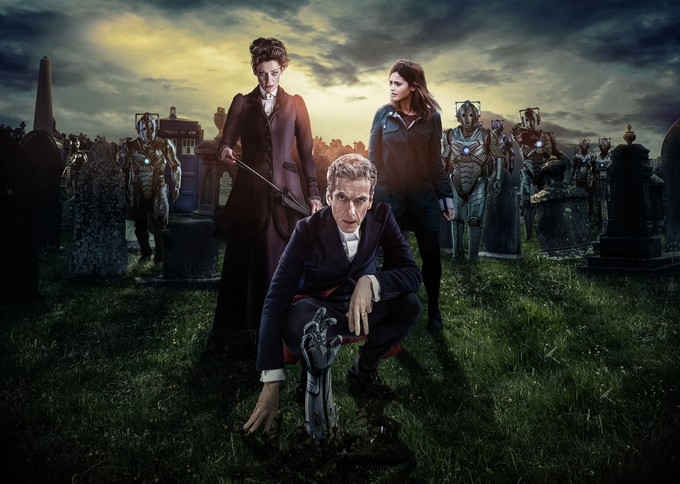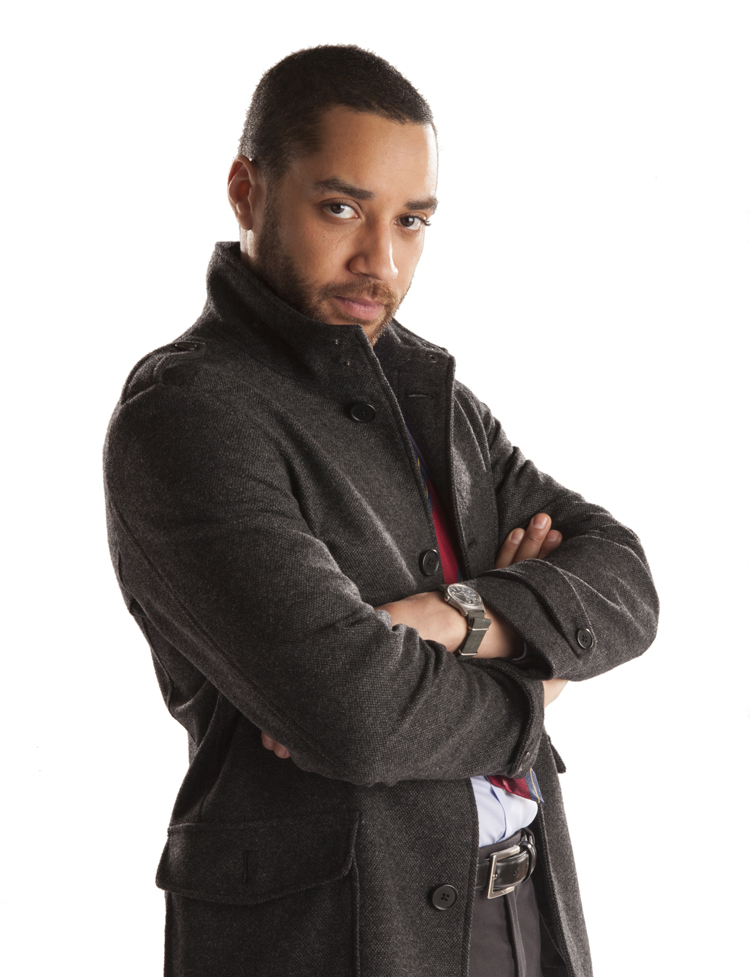The Watchmen delivered another stylistic masterpiece Sunday night. “This Extraordinary Being” shows the various parallels between Angela Abar (Regina King) and Will Reeves (Louis Gossett Jr). The episode also takes a highly creative approach in its depiction of whitewashing and Black erasure.
SPOILERS AHEAD:
The majority of Episode 6 of The Watchmen, directed by Stephen Williams, takes place in Angela Abar, a.k.a. Sister Night’s head as she experiences the effects of overdosing on nostalgia pills meant for her grandfather Will Reeves.
The first couple of scenes effectively establish the whitewashed version of the history of “The Minutemen.” The episode begins inside an airing of The Minutemen (a TV Show set in the 1940s that is within the show) depicting Hooded Justice (Cheyenne Jackson) being interrogated by the FBI. Two FBI agents berate the superhero for being gay and threaten him with exposure. Hooded Justice is forced to take off his hood, revealing a White man who then beats up the homophobic FBI agents; though we soon learn that this sanitized version The Minutemen only tells half the story.
Before I jump into Angela Abar’s barrage of memories of young Will Reeves (Jovan Adepo)’s vital memories, I want to discuss the brilliant stylistic choices of director Stephen Williams and the show’s creator Damon Lindelof. When Abar dives through the memories of her grandfather, the majority of the images are in black and white, except memories that are particularly powerful which are in color. For example, when Will cuddles with June (Danielle Deadwyler) on their bed, telling the story of when they met and a floating door opens above them, the scene is in black and white. The memory of Will as a child-rescuing baby June (Will Reeves’ wife) after the Tulsa riots in a field is in color. A fully colored wide shot shows the young Black boy picking up the baby as he comforts her.
Another way Stephen Williams depicted the memories was by sometimes having Angela take the place of her younger grandfather, the cop turned hooded vigilante. For example, when Will Reeves gets a badge, Angela Abar takes his place standing in line wearing the brand new uniform. Sometimes when young Will patrol the city his mother plays the piano on the street though nobody seems to notice her suggesting she’s haunting him in the memory. Another example of the fluidity of Abar’s memory state can be seen when Will opens an office door then walks into the middle of the city square.
Now we are going to jump into the meaty aspect of ” The Extraordinary Being” starting with the revelation that Will Reeves is Hooded Justice. We find out that his wife June thought Will needed to work through his anger and becoming a hood hero seemed a good way to do it. Especially after Will Reeves almost gets lynched by the Klu Klux Klan cops after telling his boss that he spotted one of them letting a criminal go. He was able to escape but came home still wearing a noose around his neck. The hooded hero always wears a noose around his neck. In the opening of the show, FBI agents in The Minutemen insinuate that Hooded Justice wears a noose around his neck for sexual reasons, but the real reason is for revenge against those cops that tried to kill him. Hooded Justice wears the noose to remind himself to never be weak enough to let those things happen to him again.
Sister Night and Hooded Justice both apply paint around their eyes, the first of many parallels between them. Adar paints her face darker than she already is to blend into the hood she wears so her identity as a detective remains hidden. But Reeves applies white paint so people think he’s White because June thinks the White world is not ready for a Black hero. Will questions whether he should do this since he was inspired to become a cop after watching a silent film as a child in which a hooded Black Marshall becomes a hero after revealing his race to a White rural town when he arrested a crooked sheriff. June reminds Will that the theatre where he watched the Black hero film was burnt down by racist White men during the Tulsa riots. Will agrees to wear a hood with white paint around his eyes so everybody will think he is White. Ironically, Will Reeves is the first to whitewash himself.
Another parallel between the two masked heroes is that both are investigating corrupt Klu Klux Klan cops trying to erase Black existence. Angela Adar fights against the Seventh Calvary. While Will Reeves investigates “The Cyclops” made of Klu Klux Klan leaders who hypnotize Black citizens to kill each other. Though The Seventh Calvary is a lot more visible than “The Cyclops” who was ignored by the police and press. Which brings me to the insidious racist undertones of the whitewashing of Hood Justice done first to himself than by the Minutemen.
The one thing that The Minutemen television series got right is that Hooded Justice had a same-sex relationship with Captain Metropolis, a.k.a. Nelson Gardner. Nelson Gardener first came to see Will because he thought he was Hooded Justice’s police informant, and he wanted Will to invite Hooded Justice to be a new member of the justice fighting team The Minutemen. This presumption should have been the first clue that Gardener was prejudiced since clearly, he didn’t think a Black man could be a superhero. But Will agreed to join the Minutemen because he was tickled that Gardner was inspired to become a hero by his alter ego Hooded Justice.
Later, Will has sex with Nelson in a hotel room. Gardner calls Will beautiful but says he can never let the world know that Hooded Justice is Black. Even the other Minutemen don’t know his race and would not be okay with a Black hero on their team. Gardner promises that the Minutemen will help Hooded Justice take down the KKK criminal organization “The Cyclops”, though, in the press conference announcing Hooded Justice’s induction into the Minutemen, Captain Metropolis won’t let him speak about it. Even worse, Captain Metropolis unveils a racist poster of himself aggressively gripping a Black man in front of a bank. Later on, when Will is on duty as a police officer, he finds a shot up Black movie theatre and calls Nelson Gardner for help. After speaking to an injured Black woman, he learns that she was hypnotized by The Cyclops to attack her own people. Over the phone, Captain Metropolis tells Hooded Justice that the Minutemen don’t solve those “types” of crimes and refuses to help.
Reeves received no help from either the police who just blamed the “untamed” nature of Black people and his own racist team The Minutemen. Angry and betrayed he tracks down the racist cops and community leaders. He kills all of them and then burns down The Cyclops’ lair violently ending their KKK crime spree.
The episode nails down the danger of whitewashing oneself when Will Reeves sees his son whitening himself. The little boy wants to mimic his father. Reeves get rough with his son when he attempts to wash the paint off the boy’s face. Upset by his brutality, June takes the boy and leaves him. She returns to Tulsa with her son and tells Will to never look for them. She now knows he will never stop being angry at what happened to his family during the Tulsa riots.
The last bit of memory that Abar sees is present-day Will murdering her friend Chief of Tulsa police Judd Crawford. A very old Will uses the same technology that The Cyclops used to hypnotize Black citizens to persuade the police chief to hang himself. Will accuses Judd of being part of the Seventh Calvary because he has a KKK robe hidden away. Judd denies being part of the Seventh Calvary but does admit that the robe belonged to his grandfather. He keeps the robe because it’s part of his family history, but he claims to be different from his grandfather. Will doesn’t listen. Instead, he hypnotizes Judd to hang himself. The noose has deep meaning to Will because he was almost lynched by men like Crawford’s grandfather.
The final moments of “This Extraordinary Being” left me with many questions. After living through the overdose, Angela Abar wakes up in a sweat inside Lady Trieu’s home. My question is, will Angela now take her grandfather’s side knowing they share a similar history? Will she look at the anonymous part of being Detective Sister Night as dangerous now knowing what the uniform erased in her grandfather? Also, will the audience be led to connect more with Agent Laurie Blake since she has a point about the evil nature of hooded heroes? Maybe we will find out in the next episode.











